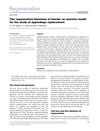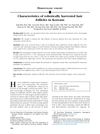Search
for
Sort by
Research
30 / 1000+ results
research Comparative Studies of Hair Shaft Components Between Healthy and Diseased Donors
Hair analysis can help identify specific minerals and amino acids linked to various diseases.
research Comparative Studies of the Specific Activity of Soft Dosage Forms of Minoxidil for Trichological Practice
Both new minoxidil formulations significantly stimulated hair growth and improved dermal metabolism.
research Comparative Studies on Polyamine Levels in Plasma and Urine of Androgenic Alopecia Patients Treated with Finasteride for a Period of Three Years
Finasteride treatment for three years changes certain polyamine levels in the blood but not in urine.

research Perspectives on Hair Evolution Based on Comparative Studies on Vertebrate Cornification
Hair in mammals likely evolved from glandular structures, not scales.

research Comparative Efficacy and Safety of Janus Kinase Inhibitors Used in Alopecia Areata: A Systematic Review and Meta-Analysis
Baricitinib and deuruxolitinib are effective for treating alopecia areata, but their efficacy depends on the dose.

research Comparative Biology of Tissue Repair, Regeneration, and Aging
The symposium concluded that understanding how different species repair tissue and how this changes with age can help advance regenerative medicine.

research Comparative Efficacy of Topical Finasteride (0.25%) in Combination With Minoxidil (5%) Against 5% Minoxidil or 0.25% Finasteride Alone in Male Androgenetic Alopecia: A Pilot, Randomized Open-Label Study
Using both minoxidil and finasteride together is more effective for male hair loss than using either one alone.

research The Efficacy and Safety of 17α-Estradiol (Ell-Cranell Alpha 0.025%) Solution on Female Pattern Hair Loss: Single Center, Open-Label, Non-Comparative, Phase IV Study
17α-Estradiol solution safely improves hair density and thickness in female pattern hair loss.

research QR 678 and QR678 Neo vs PRP—A Randomized, Comparative, Prospective Study
QR678 treatments were more effective and comfortable for male hair loss than PRP treatments.
research Clinical Review 73: Medical Treatment of Androgen-Dependent Hirsutism
Medication and hair removal methods can improve hirsutism, but no drugs were specifically approved for it in North America as of 1995.
research Combination Therapy with Injectable Platelet-Rich Fibrin and Microneedling for Male Androgenetic Alopecia: An Evaluation of Current Practice
Injectable platelet-rich fibrin with microneedling is safe and effective for male hair loss but less supported than other treatments.

research Current Indications of Low-Level Laser Therapy in Plastic Surgery: A Review
Low-Level Laser Therapy may help with flap survival and burn scar healing, but not with venous ulcers or hair loss, and more research is needed.
research Prenatal Diagnosis of a Fetus with Partial Monosomy 4p and Partial Trisomy 13q
Topical corticosteroids are the best initial treatment for children with Alopecia Areata.

research Pharmacological Therapy of Benign Prostatic Hyperplasia/Lower Urinary Tract Symptoms: An Overview for the Practicing Clinician
Medications have become the main treatment for enlarged prostate symptoms, replacing surgery and watchful waiting.
research Brow Lift in Facial Rejuvenation
Open brow lifts are still important and effective in cosmetic surgery.

research The Regeneration Blastema of Lizards: An Amniote Model for the Study of Appendage Replacement
Lizards can regrow their tails, and studying this process helps understand scar-free healing and limb regeneration.

research Mind the Gap: Sex Bias in Basic Skin Research
The document concludes that there is a significant lack of reporting on the sex and age of cells in skin research, which could affect clinical trials and treatments.

research Characteristics of Robotically Harvested Hair Follicles in Koreans
The robotic hair restoration device had a high success rate and was faster than manual methods for Korean patients.

research Review of Oral Minoxidil as Treatment of Hair Disorders: In Search of the Perfect Dose
Oral minoxidil effectively treats hair loss, with women needing lower doses (0.25 to 2.5 mg daily) and men needing higher doses (1.25 to 5 mg daily).

research Topical Use of Systemic Drugs in Dermatology: A Comprehensive Review
Using systemic drugs as creams for skin conditions shows promise, but more research is needed to confirm their effectiveness and safety.

research Management of High-Energy Avulsive Ballistic Facial Injury: A Review of the Literature and Algorithmic Approach
Early surgical treatment for severe facial injuries from high-energy impacts leads to better recovery.

research Postoperative Radiotherapy for Cutaneous Squamous Cell Carcinoma in Patients With Microscopic Residual Disease
Radiotherapy is a good option when further surgery for skin cancer isn't preferred, but more research is needed to compare it with other methods.

research Understanding Skin Morphogenesis Across Developmental, Regenerative, and Evolutionary Levels
The article concludes that studying how skin forms is key to understanding skin diseases and improving regenerative medicine.
research Tolerance and Safety Profile of Sublingual Minoxidil in the Treatment of Androgenic Alopecia
Sublingual minoxidil is a safe and effective treatment for hair loss, especially in women.

research Meta-Analysis on the Efficacy of Platelet-Rich Plasma in Patients with Androgenetic Alopecia
Platelet-rich Plasma (PRP) helps treat hair loss effectively, especially when prepared using the double-spin method.
research The Efficacy and Safety of Dr. SKS Hair Booster Serum in Adult Males and Females With Androgenetic Alopecia: An Open-Label, Non-Randomized, Prospective Study
Dr. SKS Hair Booster Serum is safe and effective for reducing hair fall and promoting hair growth.
research Folliscope Assessment of Lyophilized Growth Factors Scalp Injection in Androgenetic Alopecia
L-GF injections improved hair growth in women with minimal side effects.

research Dermoscopy in General Dermatology: A Practical Overview
Dermoscopy is a useful tool for identifying features of skin conditions, but more research is needed to define its role in dermatology.

research Gynecologic and Andrologic Dermatology and the Metabolic Syndrome
Skin diseases linked to insulin resistance should be managed to prevent diabetes and reduce heart disease risk.